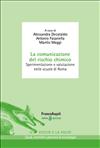
LIBRI DI MANLIO MAGGI


Sperimentazione e valutazione nelle scuole di Roma
Il volume raccoglie i risultati di una ricerca sugli esiti di una campagna di comunicazione dei rischi derivanti dall’esposizione a sostanze chimiche. L'iniziativa, rivolta agli studenti delle classi III, IV e V delle scuole medie superiori del Comune di Roma, ha esplorato il livello iniziale di conoscenze sul tema, per poi valutarne l'incremento a seguito di una campagna informativa condotta da esperti dell'Ispra, allo scopo di diffondere la conoscenza in materia e formare un gruppo di giovani cittadini consapevoli.
cod. 11315.1

Environmental sociology is one of the youngest sub-disciplines within the field of sociology. This paper examines the development of this new area of study in our country, in occasion of the twentieth anniversary of the foundation of the first departments of environmental sociology in Italy. In the first part of the article we give an overview of its historical development. In the second part, we focus on the debates, key questions and issues that the young discipline deals with. We conclude reflecting on essays by Italian environmental sociologists who, through their theoretical and empirical work, have contributed to the development of environmental sociology in our country.

This action research has been conducted by the Department of Communication and Social Research of the «Sapienza» University of Rome in collaboration with the Institute for Environmental Protection and Research (ISPRA). The aim of the study was to evaluate the efficiency of an information campaign on radioactivity and its risks, implemented by ISPRA, and directed towards students between 14 and 19 years of age in four cities of the Lazio region. The research was conducted using a quasi experimental design with pretest, post-test and non equivalent control group and did not follow a behaviorist concept of experiment, which would have proceeded on the basis of a simple stimulus-response pattern. Instead, the experimental variable, considered as the main stimulus, was taken into account together with contextual and dispositional characteristics, which can in theory intervene in the cause-effect relation but cannot be "manipulated" by the researcher.

cod. 575.5

Un approccio integrato
cod. 1535.30